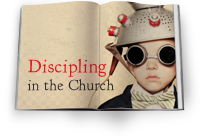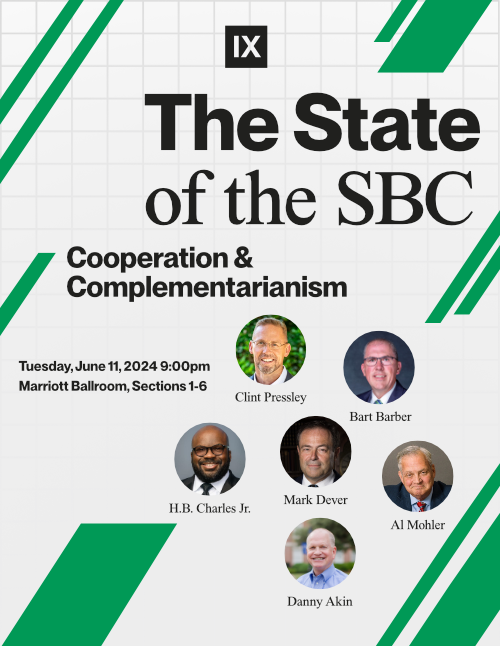Elders—The Church’s Lead Disciple-Makers
Are you an elder in your church? Then you should be one of the church’s lead disciplers. You knew that this was a key part of an elder’s job description, right?
Let me back up just to make sure it is clear. If I had to pick one image to best explain an elder’s job in the local church, the choice would be a no-brainer: the New Testament predominantly portrays elders as shepherds. Both Paul and Peter urged elders to shepherd their flocks (Acts 20:28-31; 1 Pet. 5:1-4). The writer of Hebrews called believers to submit to their leaders who “keep watch” over them “as men who must give an account” (Heb. 13:17). Peter said that elders serve as under-shepherds of the Chief Shepherd (1 Pet. 5:4). Many of an elder’s duties—including teaching the Word, guarding against heresy, modeling godliness, pursuing wayward believers, overseeing church affairs, and praying for members—can be summed up within the simple picture of a shepherd tending sheep.
But what’s the goal of shepherding?
Elders shepherd church members in order to help those members grow up in Christ. Elders tend the flock in such a way that believers develop from spiritual infancy to full-grown Christ-likeness. Overseers labor in hope that the sheep will move beyond a needy, self-focused, toddler Christianity to an adulthood of serving Jesus and leading others to Jesus.
Paul identified Christian maturity as the reason Jesus gave various leaders to the church, including pastors (i.e., shepherds):
It was he who gave some to be…pastors and teachers to prepare God’s people for works of service so that the body of Christ may be built up until we all reach unity in the faith and in the knowledge of the Son of God and become mature, attaining to the whole measure of the fullness of Christ. (Eph. 4:11-13)
When elders fulfill their duties well, believers will “no longer be infants” but will instead “grow up into him who is the head, that is Christ” (vv. 14-15). Elders should say with Paul, “We proclaim him, admonishing and teaching everyone with all wisdom, so that we may present everyone perfect in Christ” (Col. 1:28).
In other words, shepherding aims at making mature disciples. What is disciple-making if not helping people progress toward maturity in Christ?
So as the church’s shepherds, elders should lead the way and set the pace for disciple-making. All believers are called to the task of making disciples, but elders bear an overall responsibility for the discipleship work of the congregation.
When elders grasp the goal of shepherding as disciple-making and disciple-maturing, it will transform their ministry. Consider how the goal of making mature disciples might impact five common aspects of an elder’s pastoral work.
MATURING DISCIPLES THROUGH TEACHING
Elders must be able to teach the Bible (1 Tim. 3:2, 5:17; Tit. 1:9). God’s shepherds feed God’s sheep with God’s Word. And what’s the point of feeding the sheep, except to strengthen and mature them?
When an elder opens his Bible to teach fifty people at a Sunday evening service, or twelve people at a home Bible study, or one guy over a cup of coffee, he should not only focus on interpreting the Bible well, though of course that is critical. Instead, he must also look up from his Bible to see the people in their various stages of discipleship, and then connect the Bible’s truths to his congregation’s hearts, relationships, speech, and finances. He should strive to apply the text in ways that ripen Christ-followers.
MATURING DISCIPLES THROUGH PASTORAL CARE
What is the point of that elder’s hospital visit? Or why does he spend an evening with the couple devastated by infertility, or have breakfast with the elderly man who recently lost his wife of 50 years? Certainly he is there to encourage and comfort these hurting church members. But he should also be there to promote spiritual growth.
So instead of only asking, “How are you feeling?” and “Is there anything the church can do to help?” a discipleship-minded elder will tactfully ask questions like, “What do you think God is doing in your life through this difficult experience?” and “Has God showed you something about himself in the midst of your suffering?” He will not only pray for healing and comfort, but also for God’s refining, sanctifying work.
Suffering is perhaps one of God’s sharpest tools for chiseling us into Christ’s image. Elders can support spiritual growth simply by reminding brothers and sisters that their suffering has a divine purpose.
MATURING DISCIPLES THROUGH HOSPITALITY
Paul twice says that elders must be hospitable (1 Tim. 3:2, Tit. 1:8). But let’s again view this elder task through the lens of making disciples. When we do, we find that hospitality is about more than elders being friendly. Hospitality is also about elders making disciples by being examples.
An elder’s hospitality enables others to see that elder up close in his natural habitat. They see how he relates to his wife, shapes his kids, and works out his Christian faith in real life. Hospitality facilitates an elder’s ministry of modeling maturity (1 Pet. 5:3). It allows people into his life so that he can say to them, “Join with others in following my example” (Phil. 3:17).
MATURING DISCIPLES BY LIVING LIFE TOGETHER
Hospitality is just the beginning. Modeling maturity takes more than a cookout; elders must open their lives to others. Just as effective shepherds must be among the sheep, so effective elders will live life together with church members. Members need to see elders’ behavior in a variety of contexts, including work and play, ministry and misery, success and setback.
This may sound daunting to men with hectic lives and busy schedules. But doing life together is not as much about adding more to the schedule as it is about inviting others into what is already happening. So if you’re an elder, include members into your normal golfing or fishing, gaming or gardening. Commute together to work. If you teach a class at church, bring on an assistant teacher to apprentice with you.
Elders should be able to say with Paul, “We loved you so much that we were delighted to share with you not only the gospel of God, but our lives as well” (1 Thess. 1:8). As elders share their lives, members get glimpses of Christian maturity in high definition.
MATURING DISCIPLES THROUGH LEADERSHIP
Let’s take one more example: leadership. Elders lead a local church, just as shepherds lead a flock. That’s why they are called “overseers” (Acts 20:28; 1 Tim. 3:1; Heb. 13:17).
But when an elder grasps the goal of making mature disciples, he no longer sees “leadership” as merely sitting around a table making decisions. He understands that leadership includes raising up more leaders. The maturity-minded shepherd invites others into his life to share in teaching and responsibility (2 Tim. 2:2). He will demonstrate and delegate. A discipleship vision shifts an elder’s leadership focus from policies and programs to training future shepherds.
WHAT’S THE POINT OF MAKING MATURE DISCIPLES?
Why is it so critical that elders see disciple-making and disciple-maturing as the goal of their shepherding? Because making disciples isn’t really the ultimate goal.
The ultimate goal for elders, and the church, is to savor and exalt God and his glory. Both shepherds and sheep exist to reflect the image and character of Jesus.
So when elders shepherd in such a way as to grow up Christ-like disciples, they are extending the reflection of Jesus’ glory in the world. Making more and more mature disciples means there are more people treasuring Jesus, imitating Jesus, and proclaiming the good news about Jesus. Disciple-making shepherds labor to bring glory to the Chief Shepherd himself.









